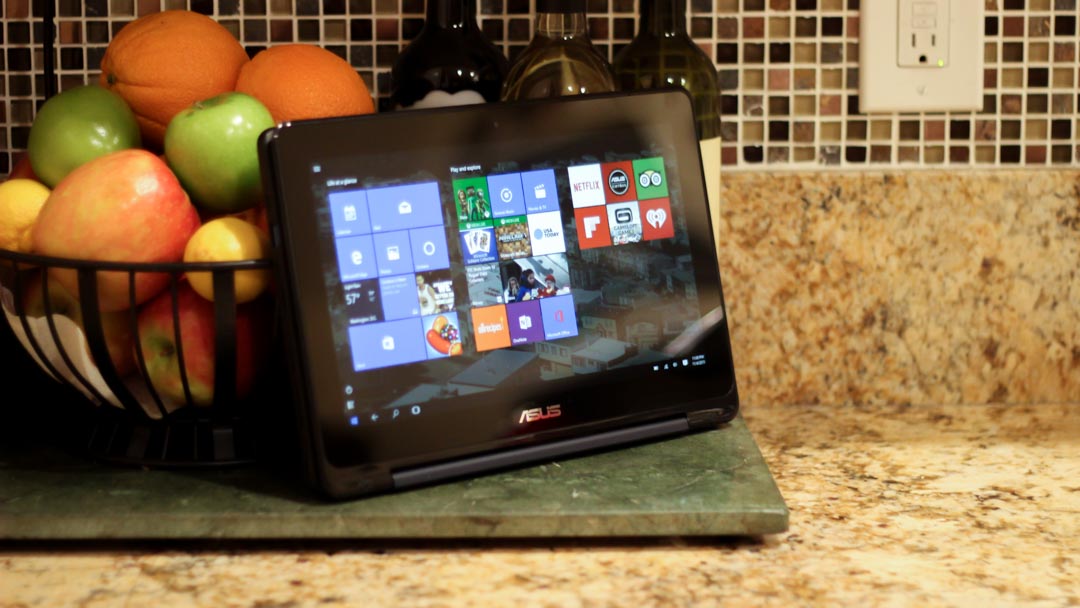TechRadar Verdict
The Asus Transformer Book Flip TP200SA is solidly built and has a few niceties, but it's merely average in performance.
Pros
- +
Great keyboard
- +
Solid build quality
- +
Great size and lightweight
Cons
- -
Mediocre display
- -
So-so performance
Why you can trust TechRadar
I have a soft spot for small notebooks in the 12-inch range. To me, it's the perfect size for a go-anywhere notebook with a screen and keyboard that's not too small. So as you might imagine, I was excited to try out the 11.6-inch Asus Transformer Book Flip TP200SA. It's compact and lightweight, and as a 2-in-1 convertible notebook, it also doubles as a tablet.
At first glance, it's a great portable machine in terms of size and features. And at only $349 (about £225, AU$479), it's a steal. Performance is lacking in some regards, but the Asus Transformer Book Flip TP200SA is powerful enough to cover your basic needs.
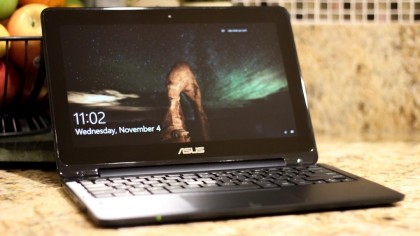
Design
Asus went with an understated look for the TP200SA, and it works well. A metallic top casing and palmrest give this low-priced machine a little more polished fit and finish than a basic glossy plastic chassis would provide. The 11.6-inch hybrid comes in a dark, almost black shade of blue, giving the TP200SA a clean, sleek look, but Asus also offers a silver-colored finish as well. The bottom case is ordinary textured plastic, which cheapens the case's feel slightly. Despite the cheaper bottom case material, the TP200SA feels solid, with minimal flexing or creaking.
The TP200SA is a 2-in-1 notebook, which means that screen can open a full 360 degrees, allowing the notebook to double as a tablet. The hinge itself feels sturdy and it moves smoothly without catching. But it is a little tight, so you may have a hard time opening it one-handed.
As is the case with most 2-in-1 notebooks, Asus had to make some compromises in the interest of serving two masters. Weighing in at 2.6 pounds, the TP200SA is light enough for occasional use as a tablet, but it's still a tank compared to standalone slates. It's lap-friendly, but you probably wouldn't want to hold it up for extended periods of time.
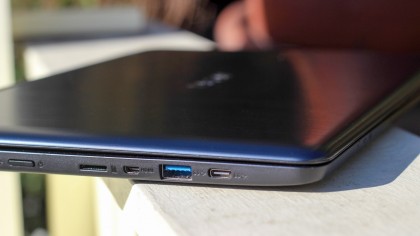
Asus placed the power button and volume switch on the upper left edge of the notebook - a tablet-friendly spot. But if you're used to having the power button adjacent to the keyboard, you might be a little confused at first.
The power switch's placement forces the TP200SA's ports forward, so they're right where you'd put your hand while picking up the notebook one-handed. It isn't a big deal most of the time, but it'll get annoying when you have a flash drive sticking out of the port.
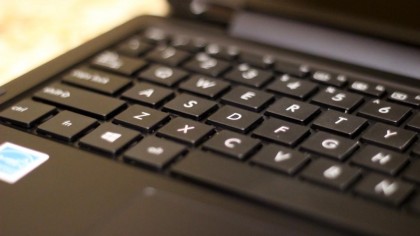
Keyboard and trackpad
Keyboards and trackpads on small notebooks are often cramped, hard-to-use affairs. As expected, the TP200SA does shrink things down for space considerations, but it isn't all bad here.
The TP200SA's keyboard feels surprisingly good to type on and provide plenty of tactile feedback and key travel. The keyboard flexes slightly, but it wasn't enough for me to notice as I worked. The keys themselves are slightly smaller than what you'll find on a full-sized keyboard, which can lead to more typos. I usually hate shrunken-down keyboards, so nice job Asus.
The trackpad is merely OK. It's decently clicky and big enough to mouse around with ease. But I'm not a fan of the trackpad button situation with the buttons integrated into the trackpad itself. I find that it's too easy to accidentally right-click since there isn't any tactile indication of where the right click button starts and ends.
It's a minor gripe in the grand scheme of things, but it gets in the way frequently enough to become obnoxious. Unfortunately, this arrangement is commonplace on modern notebooks, so if you're not a fan of this setup, well, you have little choice but to just deal with it.
The trackpad supports a handful of multitouch gestures, such as two-finger scrolling, and pinch-to-zoom. Unfortunately, all the extra touchpad commands work terribly and there doesn't seem to be any way to turn these gestures off. I'd love to see Asus make the gestures—particularly scrolling—more responsive than they currently are.
The Transformer Book Flip TP200SA is a reasonably light 2.6-pound (1.182 kg) notebook in a compact case that measures 11.69 x 7.93 x 0.73 inches (297 x 201.3 x 18.45 mm). Its footprint is nearly identical to that of the 11.6-inch Acer Aspire One Cloudbook, but it's just a hair larger than the HP Pavilion x2.
That's to be expected since the 11-inch Transformer has a larger screen than those offerings from HP (11.6 inches compared to the 10.1-inch Pavilion x2). Weight-wise, the TP200SA is about the same as the Pavilion x2 (2.62 pounds/1.19kg) and a bit heavier than the non-convertible Acer Aspire One Cloudbook (2.54 pounds/1.15kg).
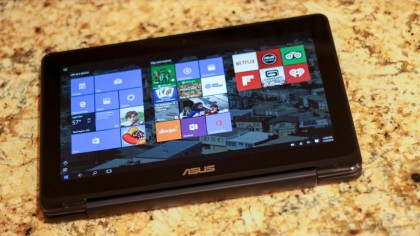
Here is the Asus Transformer Book TP200SA configuration sent to techradar for review:
Spec Sheet
- CPU: 1.6GHz Intel Celeron-N3050 (dual-core, 2MB cache, up to 2.16GHz with Turbo Boost)
- Graphics: Intel HD Graphics
- RAM: 4GB DDR3L (1,600 MHz)
- Screen: 11.6-inch 1366 x 768 IPS multi-touch display
- Storage: 64GB eMMC
- Ports: 1 x USB 3.1 Type C; 1 x USB 3.0; 1 x USB 2.0; 1 x micro HDMI; 1 x microphone/headphone combo; microSDXC card reader
- Connectivity: Dual-band 802.11ac WiFi, Bluetooth 4.1, Miracast
- Camera: 0.3-megapixel front-facing webcam
- Weight: 2.61 pounds (1.182 kg)
- Size: 11.69 x 7.93 x 0.73 inches (29.7 x 20.13 x 1.845 cm)
As configured, the $349 (£249/AU$498) TP200SA is a good deal and costs only slightly more than the smaller HP Pavilion x2, which starts around $299, (£250/AU$599). Its specs are reasonable compared to its counterparts, despite some pitfalls.
With the TP200SA, Asus opted for an Intel Celeron processor, a low-end processor running at 1.6GHz. By comparison, the HP Pavilion x2 uses a power-sipping Intel Atom processor that runs at a slower 1.33GHz clock speed.
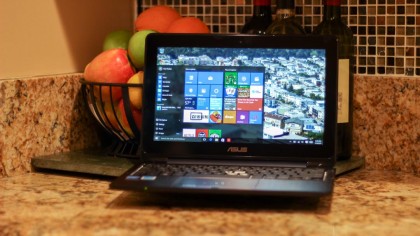
The Acer Aspire One Cloudbook, a low-cost option running around $189.99 (about £124, AU$263) comes equipped with an identical 1.6GHz Celeron N3050 processor but only 2GB of memory. The Cloudbook is a standard notebook, not a 2-in-1, which largely accounts for its lower price compared to the Asus.
The TP200SA's 64GB of eMMC solid-state storage cramped by notebook standards. Still, it's right about in line with what you can expect from a budget notebook: HP's hybrid and the Acer Cloudbook feature a scant 32GB of eMMC solid-state storage.
The TP200SA's on-board RAM stands at 4GB, an ample amount for most basic tasks that sits above the 2GB allotment on the Acer Cloudbook and Pavilion x2.
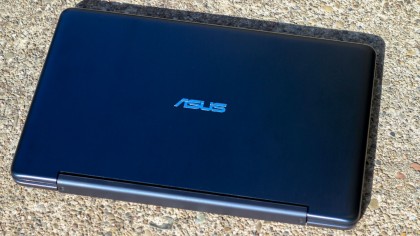
Performance
The TP200SA's Celeron processor is no performance powerhouse, and our benchmarks bear that out. It's adequate for browsing the web, listening to music, working on Word documents, and so forth, but not much else.
Benchmarks
Here's how the Asus Transformer Book Flip TP200SA performed in our suite of benchmark tests:
- 3DMark: Cloud Gate: 1,519; Sky Diver: 991; Fire Strike: 229
- GeekBench: 907 (single-core); 1,650 (multi-core)
- PCMark 8 (Home Test): 1214 points
- PCMark 8 Battery Life: 7 hours and 36 minutes
- Cinebench CPU: 63 points; Graphics: 11.50 fps
In terms of raw performance, the Asus Transformer Book Flip TP200SA is about on par with the similarly specced Acer Aspire One Cloudbook. The Transformer Book's GeekBench score of 1,650 on the multi-core test are almost identical to those put up by the Cloudbook (1,658 points – higher scores are better). The same holds true with the PCMark 8 Home Test results, as well as the 3DMark and Cinebench CPU tests.
The Pavilion x2 holds an advantage with multi-core tasks, where it scores 2,095 points on the Geekbench circuit. The Asus edges out the HP on the PCMark 8 Home Test, scoring 1,214 points to the x2's 1,106. And although it's hardly a graphics powerhouse, the Transformer book well outperformed the Pavilion x2 in gaming and graphics tests.
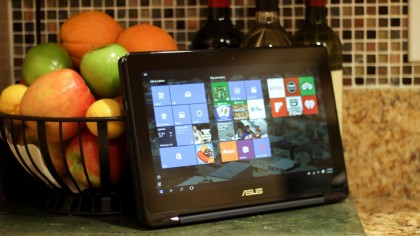
In everyday use, I find the Transformer Book to be fast enough for most tasks, but the notebook slows to a crawl when processor usage spikes: it's slow to respond to clicks, and the pointer will stutter as I mouse around. But the machine handles streaming music and HD video playback well, with no stuttering or noticeable dropped frames.
All told, the Transformer Book offers performance that's about what you'd expect from a small, inexpensive notebook. You won't want to use it for serious gaming of processor-intensive tasks, but it'll get the job done if you're looking for something for surfing the Web, watching cat videos, listening to music or catching up on some email.
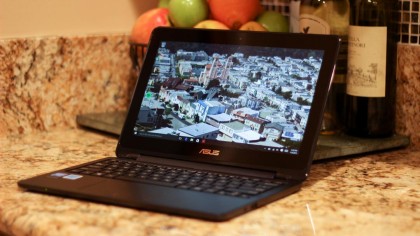
Asus's no b.s. battery
Battery life is one bright spot for the TP200SA. Asus claims the notebook can achieve upwards of eight hours on one charge, and my testing indicates that's no exaggeration. The TP200SA achieved a battery run time of 7 hours, 36 minutes, according to our PCMark 8 benchmark testing.
By comparison, the Acer Cloudbook managed 6 hours, 39 minutes of runtime and the HP Pavilion x2 ran for 7 hours, 34 minutes.
In my time with the TP200SA, I managed around six hours on one charge while browsing the web, streaming music on Spotify, watching a few YouTube videos and working in Google Docs. I had the screen at or near 100% brightness the whole time, but you can eke out a bit more run time if you dim the screen.
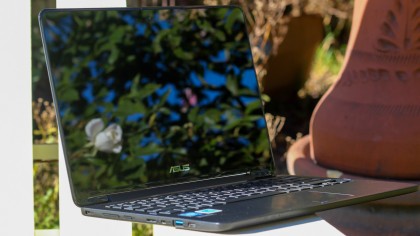
Not pretty to look at
The TP200's IPS touchscreen display has a wide viewing angle and offers good contrast, but it isn't without its flaws. At 1,366 x 768, the TP200SA has a relatively low resolution compared to some of its competition in the world of 1080p Chromebooks. On the other hand, the Acer Cloudbook shares the Transformer Book's same exact screen size and resolution.
Text and images aren't quite as sharp as these appear on some other comparable notebooks - something that stands out in our increasingly ultra-high-resolution world - but for what it is, the TP200's screen is reasonably crisp. Text isn't as smooth as I'd like, but photos appear plenty sharp from a typical viewing distance.
The backlight isn't super bright - my circa-2012 MacBook Air offers a significantly brighter backlight - but it's ample for indoor use. The limited backlighting, combined with glare the screen's glass cover picked up, makes it a little difficult to use the TP200SA outdoors, even on a cloudy day.
Color quality is another matter. While the TP200's screen is acceptable for most tasks, photos appeared somewhat dull and muddied, with a noticeable yellowish cast in some of the test images I used. The screen's good contrast ratio makes up for some of its shortcomings, but in some cases it's almost too good: lowlights and darker areas become almost too dark and hard to make out. The picture looks good enough for most people, but if you're fussy about your screens, things might look a little off.
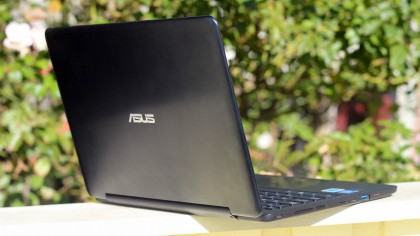
Good audio for a notebook
The TP200SA features a pair of stereo speakers mounted on the bottom of the machine. These are adequate for casual use: the audio quality isn't super rich nor is volume very loud, but the sound is clear and isn't too tinny.
In other words, the speakers are about as good as you're going to find on a small notebook. Being located on the bottom, the speakers might get a little muffled if you use the TP200SA on your lap, but I didn't find this to be a big deal. In some cases, it actually improved the audio quality by having the sound bounce off a tabletop.
Bundled software
Asus bundled a handful of apps with the Transformer Flip TP200SA, such as a trial of McAfee's LifeSafe Internet Security suite, 25GB of free Dropbox storage (for new users), plus various other apps and special offers available through the Asus Gift Box app. For the most part, the bundled apps stay out of your way, but McAfee's suite has an annoying habit of creating various pop-ups in the lower-right corner. These are more annoying than usual given the messages take up a large portion of the TP200SA's small screen.
You don't expect a lot when you pay $350 for a laptop. And despite the intermittent lag issues I experienced with my review unit, it makes for a good budget 2-in-1 option.
We liked
Asus's Transformer Book TP200SA has a great keyboard, especially given its size, and it's a slick-looking machine. Audio quality is good for a small notebook, even though it isn't very loud. Its benchmark scores are also about in line with what you'd expect from a notebook of its affordable nature. Build quality is solid given its low price, with no creaky parts and a hinge that feels as if it'll hold up over the long haul.
We disliked
While the Transformer Book TP200SA's should suffice as a web-browsing machine, my review unit exhibited some intermittent performance issues that affected very basic things like scrolling and mousing around.
The screen, while not awful, leaves something to be desired. Its color accuracy is slightly off, which causes onscreen images to appear muddied and dull.
Final verdict
At $349, the Asus Transformer Flip TP200SA is an enticing 2-in-1 notebook, but unless your needs are very basic or you're on a tight budget, you'd be better served paying a little more for a machine with a little more power. And if you're willing to forego the touchscreen and tablet capabilities, you may want to consider saving some coin and opting for the Acer Aspire One Cloudbook instead.
